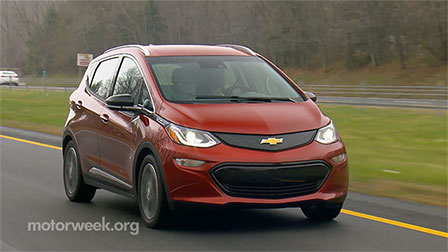Nov. 4, 2017
Smart Car Shopping (Text Version)
This is a text version of the video segment Smart Car Shopping, which aired on Nov. 4, 2017.
LAUREN MORRISON: Today's savvy car buyers know that spending quality time online, researching models, specs and prices will save you time and money here, on the dealership lot. Doing your homework ahead of time is the key, and there are plenty of shopping tools available to help guide your decision.
Stephen Dupal and his fiancee Sherryn Daniel are in the market for a small, economical commuter car to replace Stephen's aging Corolla. Before heading to commercial web pages for option packages and pricing info, several federal government sites helped narrow their search in the areas of fuel economy, safety and alternative fuels—three of their key parameters.
The Joint Department of Energy and EPA Fuel Economy website provides convenient, one stop shopping for everything most buyers will ever want to know about maximizing mpg in their next car. Here, consumers can compare up to four different vehicles at a time, and their fuel economy ratings, energy and environment scores, basic engine and transmission size, driving range, and annual fuel costs, along with real-world fuel consumption data provided by actual owners. The website had over 25 million user sessions last year.
STEPHEN DUPAL: I like to have like those charts and plots and graphs to kind of compare things in a numerical basis so I know what I'm looking for and then I can verify, oh yes, this car will have what I need based on these metrics.
LAUREN MORRISON: Other useful content on the website, and free fuel economy mobile app, includes driving and maintenance tips to help you get the most out of your vehicle, easy to understand descriptions of new vehicle technology, information about available tax incentives for advanced-technology vehicles, trip calculators, and more.
In the area of safety, you can start with the government's Safercar website (safercar.gov) for how a car fares in mandated crash testing and rollover ratings. The site spells out which vehicles go beyond requirements and have cutting edge safety technology.
SHERRYN DANIEL: What I like about the Safercar website is there's just so many little applications, where all we have to do is the make and the model of the car, and we can see if it was recalled, we can look for certain safety features, I even learned about rollover. That this is the most lethal type of car accident and that with the best type of car, you can prevent damage.
LAUREN MORRISON: But, you're a consumer or a fleet manager that is up to date, maybe even ahead of the crowd. So perhaps, a plug-in hybrid or even full electric car fits your lifestyle or business. Or a vehicle that runs on another non-traditional fuel like e85, bio-diesel, natural gas, propane, or even hydrogen.
Now, you need to know not only the specs, but the pros and cons, and practicality of each fuel. Well, for that, more than 1.5 million users a year check out the Energy Department's Alternative Fuels Data Center website (afdc.energy.gov). The AFDC website and alt fuel app are designed to eliminate your confusion over the various types of alternative fuels and their vehicles. And now that plug-in and alt fuel vehicles are being sold with ever increasing range, the website's fueling station database is enjoying increasing popularity as well.
SHERRYN DANIEL: There's this link where you can just type in your state. So, if we bought like a hybrid, or a car that uses natural gas or something like that, we can look up stations nearby ahead of time when we make travels.
LAUREN MORRISON:
The end game in all this is to be the best informed new car shopper you can possibly be, and ultimately, to buy or lease a new car, SUV, or truck, you can live with today, and way into the future. These commercial-free, .gov websites can help you to avoid costly mistakes and surprises, before and after you visit the dealership.
